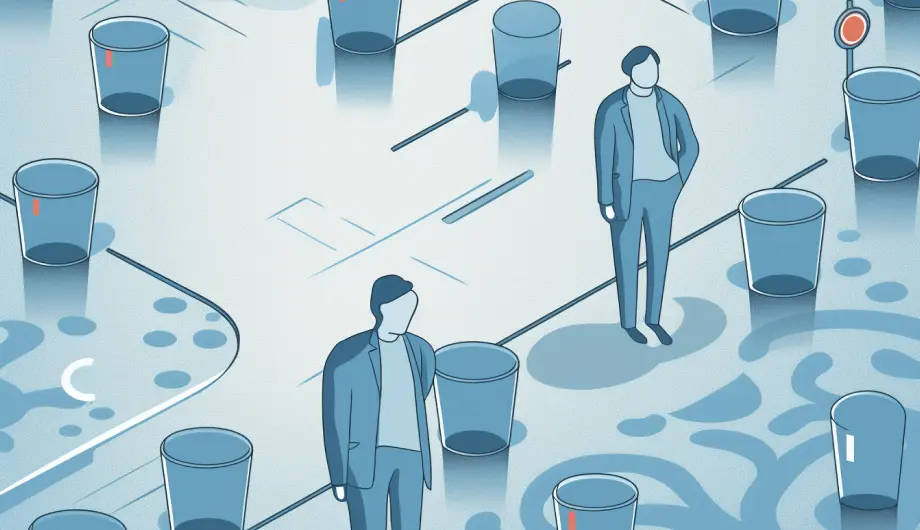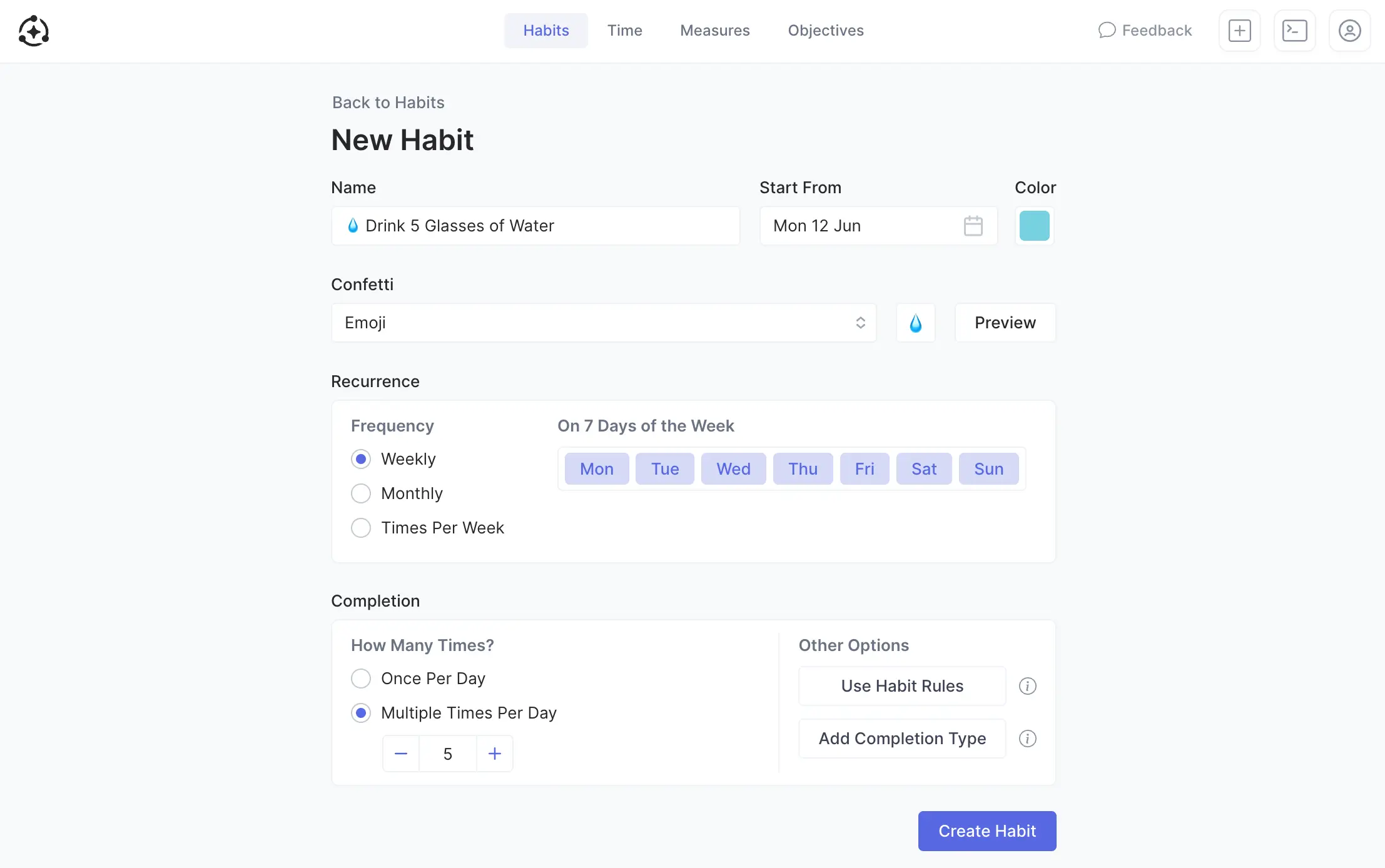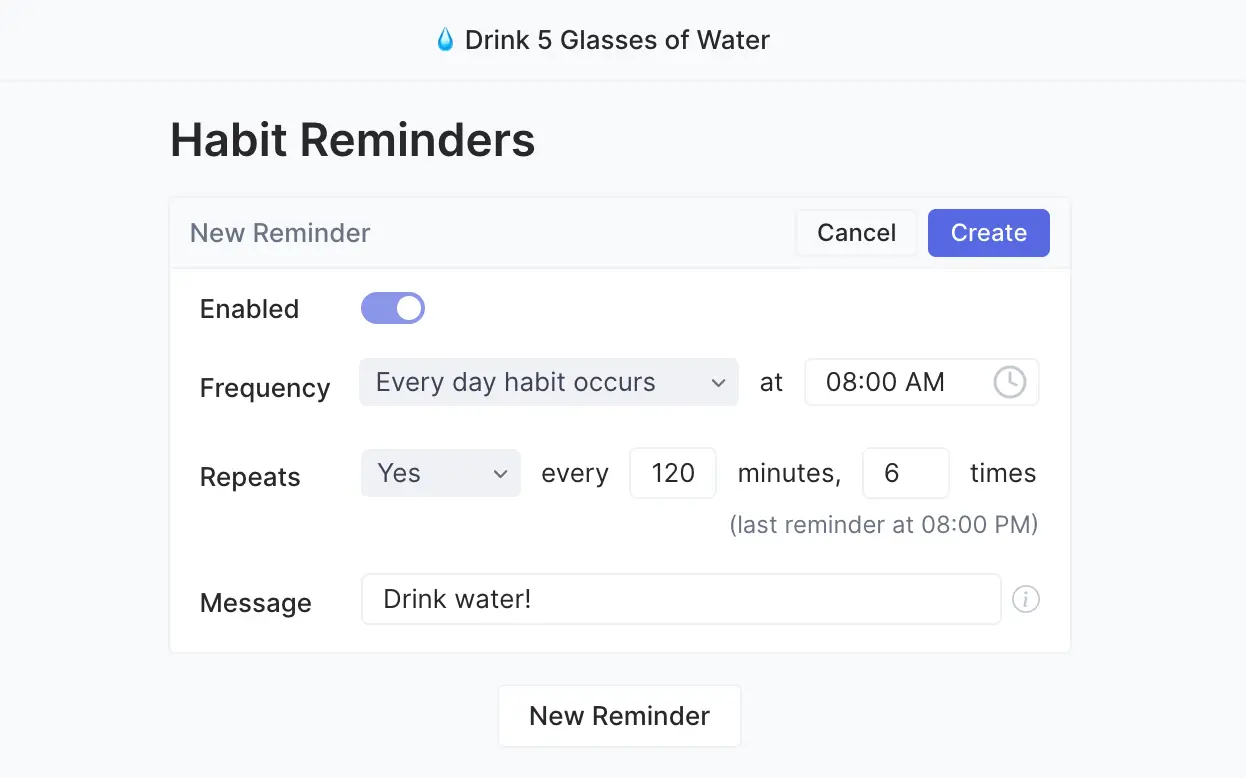Habits
Form, build and maintain habits. Use simply or sophisticatedly, with automation and customization.
Learn More →Time Tracking
Seamlessly track time on web and mobile with minimal friction. Use to complete Habits and Objectives.
Learn More →Measures
The data layer powering the wider ecosystem. Easily track manually or automatically with integrations.
Learn More →Objectives
Define success and then achieve it through Habits, Time Tracking, Measures and Integrations.
Learn More →
It's a common topic that has been debated many times, and there's a lot of confusing information out there, but if you've been wondering how much water you should drink, we're here to help you out.
Water is essential for our bodies to function optimally, as it plays a crucial role in various physiological processes. For example, it helps to regulate body temperature, aids in digestion, carries nutrients to our cells, lubricates the joints, flushes out waste products, and even affects our mental health.
You've likely heard that adults need to drink eight glasses of water per day. However, this guideline does not take into consideration the vast differences between individuals, such as age, body weight, and diet, or the fact that we obtain a significant amount of our daily water intake from the foods we consume.
While there are nuances to the following recommendation by the National Academy of Medicine, here's the quick answer to how much water an adult should drink per day for health:
- For adult men, the suggested daily intake is about 13 cups (3 liters/101.5 ounces) of total water, including from beverages and food.
- For adult women, the recommended daily intake is about 9 cups (2.1 liters/71 ounces) of total water, once again, from all sources, including moisture-rich foods and all beverages.
Getting enough fluid may seem like a complex task, but don't worry—in this article, we'll not only delve into the benefits of water on the human body and explore the role of hydration in our overall well-being—we'll also give you some tips and tricks to boost your water drinking habit and shed some light on how water-rich foods contribute to the fulfillment of our daily water requirements.
Need help staying hydrated?
Our powerful habit tracking platform, can help you stay on top of your hydration levels and develop a better water drinking habit.
The importance of water

Water is the foundation of life for most living species on earth, and it constitutes about 60% of our body weight. Needless to say, staying properly hydrated is essential for keeping the body functioning properly, as well as overall health.
Adequate hydration has a number of important effects on the human body, including:
- The regulation of body temperature—water acts as a coolant, enabling the body to maintain a stable temperature through processes like sweating and evaporation.
- Supporting digestion—sufficient fluid intake facilitates the breakdown and absorption of nutrients in the digestive system. It also helps prevent constipation by promoting regular bowel movements.
- Boosting circulation—blood, which transports oxygen and nutrients to all parts of the body, is primarily composed of water. Therefore, getting enough fluid supports healthy blood circulation.
- Cushioning the joints and protecting tissues—water serves as a lubricant for our joints and acts as a shock absorber for our vital organs, protecting them from damage. It also has a huge impact on skin health, keeping the skin elastic and looking young.
- The removal of toxins and waste—water assists the kidneys in filtering waste products from our blood and eliminating them through urine. It also helps remove toxins through perspiration and breathing.
On the opposite end of the scale, there are some negative effects to not consuming enough water, and some of these make it well worth improving your water intake.
- Poor mental health—although the precise number varies from source to source, it is generally agreed that the human brain is about 80% water. Allowing your brain's hydration levels to drop can cause not only headaches, like the ones we've all experienced after a night of indulgent fun, but also a dip in mental clarity and hormonal imbalances that can lead to depression and anxiety.
- Inefficient digestion—water is one of the most essential aspects of digestion, as it keeps the food moving through your system. Without it, you are likely to experience stomach cramps, intestinal pain, and constipation.
- Muscle cramps—your blood is largely made up of water, so when you consume too little water, you essentially dehydrate your entire body. The flow of blood to your extremities will be limited, leading to muscle cramps. Having too little water in your system also alters the salt and electrolyte levels in your body, causing your muscles to function sub-optimally.
- Overall ill health—there are numerous effects of dehydration, some of which can lead to serious illness or even death if the problem is not resolved. Some of these are kidney stones and kidney failure, muscle damage, swelling of the brain, and seizures.
What are the daily water intake recommendations?
Determining the ideal amount of water to drink daily can be challenging because it varies significantly based on factors like age, sex, weight, physical activity level, climate, and other individual variations.
For example, some people may need to drink more water due to certain medical conditions, medications, or lifestyle factors.
If you've spent some time looking into your fluid needs, you will likely have heard of the "8x8 rule" (eight 8-ounce glasses of water per day). While it is a commonly cited guideline, it's important to remember that it is a rough estimate and not based on scientific evidence.
The National Academy of Medicine (NAM) offers a general recommendation for our daily water intake. For adult men, the NAM suggests a daily intake of about 3.7 liters (125 fl. oz. or around 13 cups) of total water, including from beverages and food.
For adult women, the recommended daily intake is about 2.7 liters (91 fl. oz. or about 9 cups) of total water, once again, from all sources, including moisture-rich foods and all beverages.
Can we get hydration from food?
Contrary to popular belief, our hydration needs are not solely met by drinking water. Approximately 20% of our daily fluid intake comes from solid foods—especially fruits and vegetables with high water content.
Foods like watermelon, cucumbers, oranges, and lettuce have a lot of water in them, and they can contribute a significant amount towards overall hydration if eaten in large amounts. For example, watermelon consists of a whopping 92% water and is one of the most hydrating foods you can eat. Foods that are cooked with lots of water, like soups and stews, are also good sources of fluid intake.
Other beverages, which we may not think of as water sources, like milk, herbal teas, and even coffee, can also contribute to our daily fluid needs.
Caffeinated drinks like coffee or tea have long been thought to be dehydrating due to their diuretic effects, but according to the National Library of Medicine, recent science has shown that the amount of water in these beverages likely balances out the diuretic effect and may even contribute to hydration.
By including water-rich foods in our diet, we can enhance hydration while benefiting from the essential vitamins, minerals, and fiber they provide. This can be particularly helpful for individuals who struggle to consume large amounts of water throughout the day or engage in physically demanding activities that increase fluid loss.
Don't stop drinking water

Despite the fact that we get some of our fluid intake from certain foods and other beverages, drinking water is very much still necessary, and people who choose to quench their thirst only on sodas and other sugar-laden drinks are likely to suffer from illness and general low health. They also tend to suffer from spikes and dips in energy as a result of the sugar intake, and this can lead to mood swings, jitteriness, and anxiety.
It's important to note that exercise and sweating increase water loss, so people who exercise regularly, especially those who do intense workouts, will need to drink more water than the average sedentary person to remain fully hydrated.
Consumption of alcoholic beverages and other diuretics may also lead to increased fluid loss, and people who consume these beverages may need to drink additional water to maintain hydration.
Proven habits for staying hydrated
To keep your hydration levels optimal, consider implementing the following habits:
- Listen to your body—thirst is a reliable indicator that your body needs water. After all, that's what the sensation is there for. Pay attention to your thirst cues, and drink water when you feel thirsty, rather than sodas or energy drinks. Tiredness can also be an indicator that your body needs water, so pay attention to your energy levels and consider what low energy could mean.
- Carry a water bottle—keep a reusable water bottle with you and keep refilling it throughout the day to make water convenient and easily accessible. This will encourage you to drink water regularly. Keeping a glass or bottle of water on your desk at all times can serve as a visual reminder to drink water while you work. Another option is to create a location cue for yourself, like drinking a glass of water every time you enter the kitchen.
- Set reminders—use alarms or smartphone apps to remind yourself to drink water at regular intervals, especially if you tend to forget or get absorbed in daily activities. You can also track your water intake through an app. For example, Conjure's habit tracking dashboard is an excellent way to keep track of your water intake and remind you to drink enough water throughout the day.
- Flavor it up—if drinking plain water becomes monotonous or you don't like the taste, try adding a slice of lemon or cucumber, or add a splash of fruit juice to enhance the flavor. This can make drinking water more enjoyable.
- Monitor your urine color—pay attention to the color of your urine. Pale yellow or clear urine is an indication of proper hydration, while darker urine may suggest dehydration. Please note, however, that if you are not well, dark urine could be an indicator of another condition, such as kidney failure or high levels of toxicity. You should contact your doctor if you suspect that your dark urine is due to more than dehydration.
Enjoy this helpful video that discusses the 8 glasses a day myth:
How to use Conjure to help you remember to drink water
With Conjure, you can quickly and easily set up a Habit to drink a certain amount of water each day. For example, if you want to drink half a gallon of water each day, you can create a habit that you can mark off once you have completed the task.
If you'd like to take it one step further, you can track your water intake throughout the day by creating a “multiple times per day” habit and clicking the checkbox every time you drink a glass of water.

You can set it for specific days of the week and specific times of day, if you like, and you can set up “Emergency” completion types for days when there is a reason why you might miss your goal.
For example, you could set up a completion type called “Traveling,” which would allow you to mark your water goal as incomplete due to travel—after all, nobody wants to be running to the bathroom every 5 minutes on the plane!
You can also set up reminders so that you don't forget to drink water throughout the day. In the example below, I have set up a first reminder to drink water at 8 am every morning, and then set it to repeat every 2 hours after that until 8 pm. That way, I am reminded every 2 hours to drink some water, and it becomes easier to reach my goal of half a gallon a day.

The beauty of Conjure is that you can use it as simply or as complex as you like. The example above is a quick and simple way to set up your water habit and ensure that you remember to drink regularly.
Say goodbye to dehydration
Use Conjure to establish a water-drinking habit that sticks
Frequently asked questions
Can you drink too much water?
Yes, it is possible to drink too much water. In this unlikely scenario, your kidneys wouldn't be able to process all the excess water, and the sodium content in your blood would become diluted. The name for this life-threatening condition is hyponatremia.
However, drinking enough water to cause hyponatremia is very difficult. A person with healthy kidneys should be able to process between 27 and 34 ounces of water each hour (800 ml to 1 liter), which adds up to a total of between 675 and 945 ounces (20 to 28 liters) in a day. I know I'm not in any danger!
When should I drink water?
You might be wondering when the best time is to drink water during the day. We all know that drinking too much water before bed can lead to a very interrupted night's sleep! So here are the 3 best times to drink water.
- You should always start your day with water—your body dehydrates significantly while you sleep, and you need to rehydrate it as quickly as possible after you wake up.
- Avoid the mid-afternoon slump by boosting your hydration—if you tend to feel drowsy in the afternoon, it could be because your hydration levels are a bit low.
- Always drink water when you exercise—remember that exercise dehydrates your body and taxes your muscles. Because of this, you should drink water before you start exercising, throughout your workout, and for a while afterward.
Other notable times to drink water include:
- During headaches and migraines—headaches are a common symptom of dehydration and migraines can be caused by dehydration.
- When you are sick with a cold or flu—fluids are especially important when you have a fever to replace the water you lose through sweating, but also to help your body recover.
Many people think it is good to drink lots of water before going to sleep, but that's not necessarily true. Drinking some water is good for staving off the inevitable dehydration and keeping the heart and brain healthy through the night, but too much could cause too many interruptions through the night, damaging your sleep and causing sleep deprivation.
It's best to drink only a small amount of water before you go to sleep, like a half glass or less.
Are coffee and tea dehydrating?
It was previously believed that diuretic drinks like tea and coffee were dehydrating, but we now know that the amount of water gained from them balances out the diuretic effects, and that they can indeed be counted toward your daily water intake.
How do I work out my fluid intake by weight?
The rule of thumb is that a human adult should consume half their pound weight in ounces. For example, a person weighing 150 lbs (68kg) should be consuming 75 ounces (about 2.2 liters) of water a day.
Bear in mind that this is the requirement from all sources for an inactive person. So if you are getting around 20% of your daily water intake from food, you would only need to be drinking 60 ounces (1.77 liters) of fluids each day.
This does not take into consideration fluids lost during strenuous exercise, so be sure to increase your fluid intake if you are working out.
What color should my urine be?
Many people think that the lighter the color of their urine, the healthier they are, but that's not necessarily true. Urine is the waste product of the urinary tract, whose job it is to filter your blood. In short, urine is just filtered blood!
This means, firstly, that not getting enough water will make your urine darker because the blood is not being filtered properly, and secondly, that very light urine that looks like water is not actually totally healthy, and can be taken as a sign that you are over-hydrated. Your urine should be light yellow in color for optimal health.
Conclusion
While the exact amount of water needed for proper hydration varies from person to person, it is important to pay attention to your hydration levels for your overall well-being.
Water plays a vital role in maintaining optimal bodily functions, and it is essential to drink enough water and consume plenty of water-heavy foods to stay adequately hydrated.
By understanding the benefits of water and considering the contribution of food to our daily water intake, we can make informed choices to support our hydration needs.
Remember to listen to your body's signals, keep a water bottle handy, and incorporate water-rich foods into your diet for a balanced approach to hydration.
Also, remember to use Conjure to track your water habit and any other goals, and set reminders so you don't forget to drink.
Cheers to good health and staying hydrated!
About Conjure
Conjure is the ultimate time management and habit tracking tool designed to help you effortlessly manage your time, develop positive habits, and transform your productivity game.
Seamlessly organize your habits, track your time, see your progress, and stay on top of your goals with Conjure.
Join Conjure today and take back control of your schedule!

